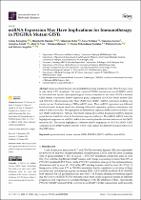| dc.contributor | Vall d'Hebron Barcelona Hospital Campus |
| dc.contributor.author | Ravegnini, Gloria |
| dc.contributor.author | Nannini, Margherita |
| dc.contributor.author | Indio, Valentina |
| dc.contributor.author | Serrano Garcia, César |
| dc.contributor.author | Gorini, Francesca |
| dc.contributor.author | Astolf, Annalisa |
| dc.date.accessioned | 2022-11-28T11:02:05Z |
| dc.date.available | 2022-11-28T11:02:05Z |
| dc.date.issued | 2022-10-14 |
| dc.identifier.citation | Ravegnini G, Nannini M, Indio V, Serrano C, Gorini F, Astolfi A, et al. miRNA Expression May Have Implications for Immunotherapy in PDGFRA Mutant GISTs. Int J Mol Sci. 2022 Oct 14;23(20):12248. |
| dc.identifier.issn | 1422-0067 |
| dc.identifier.uri | https://hdl.handle.net/11351/8537 |
| dc.description | Gastrointestinal stromal tumors; MiRNAs; MicroRNAs |
| dc.description.abstract | Gastrointestinal stromal tumors (GISTs) harboring mutations in the PDGFRA gene occur in only about 5–7% of patients. The most common PDGFRA mutation is exon 18 D842V, which is correlated with specific clinico-pathological features compared to the other PDGFRA mutated GISTs. Herein, we present a miRNA expression profile comparison of PDGFRA D842V mutant GISTs and PDGFRA with mutations other than D842V (non-D842V). miRNA expression profiling was carried out on 10 patients using a TLDA miRNA array. Then, miRNA expression was followed by bioinformatic analysis aimed at evaluating differential expression, pathway enrichment, and miRNA-mRNA networks. We highlighted 24 differentially expressed miRNAs between D842V and non-D842V GIST patients. Pathway enrichment analysis showed that deregulated miRNAs targeted genes that are mainly involved in the immune response pathways. The miRNA-mRNA networks highlighted a signature of miRNAs/mRNA that could explain the indolent behavior of the D842V mutated GIST. The results highlighted a different miRNA fingerprint in PDGFRA D842V GISTs compared to non-D842Vmutated patients, which could explain the different biological behavior of this GIST subset. |
| dc.language.iso | eng |
| dc.publisher | MDPI |
| dc.relation.ispartofseries | International Journal of Molecular Sciences;23(20) |
| dc.rights | Attribution 4.0 International |
| dc.rights.uri | http://creativecommons.org/licenses/by/4.0/ |
| dc.source | Scientia |
| dc.subject | Aparell digestiu - Càncer - Aspectes genètics |
| dc.subject | Anomalies cromosòmiques |
| dc.subject | Aparell digestiu - Càncer - Immunoteràpia |
| dc.subject.mesh | Gastrointestinal Stromal Tumors |
| dc.subject.mesh | Immunotherapy |
| dc.subject.mesh | Mutation |
| dc.title | miRNA Expression May Have Implications for Immunotherapy in PDGFRA Mutant GISTs |
| dc.type | info:eu-repo/semantics/article |
| dc.identifier.doi | 10.3390/ijms232012248 |
| dc.subject.decs | tumores del estroma gastrointestinal |
| dc.subject.decs | inmunoterapia |
| dc.subject.decs | mutación |
| dc.relation.publishversion | https://doi.org/10.3390/ijms232012248 |
| dc.type.version | info:eu-repo/semantics/publishedVersion |
| dc.audience | Professionals |
| dc.contributor.organismes | Institut Català de la Salut |
| dc.contributor.authoraffiliation | [Ravegnini G, Gorini F] Department of Pharmacy and Biotechnology, University of Bologna, Bologna, Italy. [Nannini M] Department of Specialized, Experimental and Diagnostic Medicine, Sant’Orsola-Malpighi Hospital, University of Bologna, Bologna, Italy. Division of Oncology, IRCCS Azienda Ospedaliero Universitaria di Bologna, Bologna, Italy. [Indio V] Department of Veterinary Medical Sciences, University of Bologna, Ozzano, Italy. [Serrano C] Sarcoma Translational Research Laboratory, Vall d’Hebron Institute of Oncology (VHIO), Barcelona, Spain. Servei d’Oncologia Mèdica, Vall d’Hebron Hospital Universitari, Barcelona, Spain. [Astolfi A] Department of Specialized, Experimental and Diagnostic Medicine, Sant’Orsola-Malpighi Hospital, University of Bologna, Bologna, Italy |
| dc.identifier.pmid | 36293105 |
| dc.identifier.wos | 000875423400001 |
| dc.rights.accessrights | info:eu-repo/semantics/openAccess |

